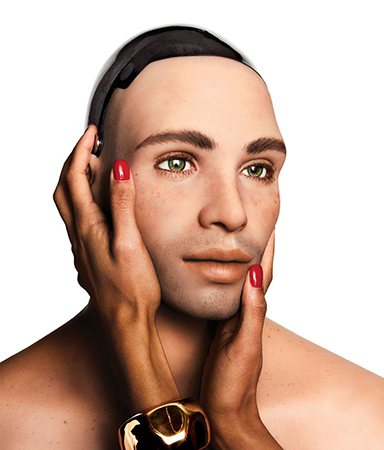
Pitfalls & Promise of a New Industry
Sex Robots Will Never Make You Cry…Maybe
August 25th is National Kiss & Make Up Day. Seriously! Look it up.
For all of those couples, partners, and significant others intending to kiss and makeup, best of luck. The crying and ill will is over. For all of you who would rather wave goodbye and get moving, robotics has an alternative for you to consider. Robotics always has solutions to everything.
Try a sex robot next time around. Sex robots are incapable of lying, cheating, or making you unhappy, and they won’t run around on you…because they can’t walk.
If you are willing to consider an alternative, this next article is for you.
We call it: Sex Robots Will Never Make You Cry…Maybe
Article provided by: This Is Robotics: Radio News
World’s #1 Podcast on Robotics, Automation and People
You’re going to love what you hear!
Andrea Morris said it well in her headline: Sex Robots Are The Most Disruptive Technology We Didn’t See Coming.
The first paragraph of her article says it all: “At first glance, Harmony looks a bit like a chatbot got trapped inside an anatomically correct, life-size Barbie. But on closer inspection, it’s hard to shake the feeling that sex robots have the potential to thoroughly disrupt how we interact with technology, as well as how we interact with each other–and whether some not-insignificant portion of the population will opt out of interacting with humans altogether.
“Robots have been taking our jobs outside of the home. They are on the verge of replacing humans as providers of many of our more personal needs, from domestic work to intimacy. Is this inevitable? And is it even a bad thing?”
MIT’s Cynthia Breazeal, in an interview after a TedTalk, remarked that robots know how to push all of our buttons: “They [robots] push our social buttons stronger than any other technology.” Meaning that, since robots are the only thing that has ever replied to a human in human language, that humans are innately attracted to them in a way that is sort of inexplicable, but very evident and real.
ABC’s Katie Couric had lunch and a chat with Harmony; Couric was reporter-composed during the interchange. But when she met Henry Jr., a male sex robot who told her that she had a “perfect ass”, she blushed. A little button-pushing there, I’d wager. She then drove off with Henry in a classic, pink Thunderbird.
According to a study conducted by YouGov, “more than one in five Americans (22 percent) say they would consider having sex with a robot.” One demographic surveyed, the 18-34 group, has 76 million people, which means that there are millions of people, some of whom would only consider having sex with a robot, but some other millions more would gladly go through with having a few of their buttons pushed by an AI-infused sex robot, like Harmony or Henry.
The slice of AI that Breazeal supports, namely, relational AI, might be a good future next step up for these sex robots. When asked by the interviewer: “Can AI help us become who we aspire to be? Can it help us live not just more productive but better, more fulfilling lives?” she explained it this way: “When we talk about human flourishing,” she said, “it’s not about brief encounters with AI. Positive emotions, meaning, a sense of achievement, relationships — all those things are extremely important. I call it ‘relational AI’ — AI that can understand us as people and treat us as people.”
“There’s no question that personal robots and other AI systems are becoming a growing presence in our lives,” remarked the interviewer. “But while Apple’s Siri, Google Home and Amazon’s Alexa can carry out certain tasks, they can’t truly support who we are, according to Breazeal.
Relational AI, for humans in pursuit of intimacy, more than just sex, might find relational AI to be the killer app for sex robots.

Adamant in opposition to getting close to a sex robot for any reason are websites like Feminist Current and its, An Open Letter on the Dangers of Normalizing Sex Dolls & Sex Robots.
Feminist Current writes: “At a time when pornography, prostitution, and child exploitation is facilitated and proliferated by digital technology, turning it into a global profitable industry; these products further promote the objectification of the female body and as such constitute a further assault on human intimacy.”
The malefactors in all of this, according to the website and its Campaign Against Sex Robots: “These technologies are developed and backed by academic and business robotics and Artificial Intelligence (AI) communities who have to date, the loudest voices shaping the policy direction about the benefits of sex robots while largely ignoring the potentially dangerous effects on women, men, and children.”
That’s definitely not how to win friends and influence people. That sounds mighty close to a blanket condemnation of all those working in robotics and AI. Conspiracy theories aside, that just simply isn’t true.
See related article:
Robots for the Lonely Crowd & Aching Hearts
Is a “human-like” companion just as good as the real thing? With loneliness rising to alarming levels, how about lonely-hearts clubs where humans and robots hook up for lifelong companionship?
Connecting the dots
The facts are that humans are going to continue to explore for themselves with sex robots.
Dr Helen Driscoll of the University of Sunderland says “The point is, people already fall in love with fictional characters, even if there is no chance to meet and interact with them.” How many humans readily let go of their emotions and fall in love with a character in movie. Plenty.
Dr David Levy, who founded the International Congress on Love & Sex with Robots, has outlined how machines will advance to form loving relationships with humans.
“There are millions of people out there,” says Levy, “who, for various reasons, don’t have anyone to love or anyone who loves them. And for these people, I think robots are going to be the answer.”

With a suicide happening every 20 minutes somewhere in the world, with levels of clinical depression as rampant as COVID, the World Health Organization totals out some 264 million people of all ages suffer from depression, and that depression is a leading cause of disability worldwide and is a major contributor to the overall global burden of disease.
AI is key in Levy’s evolution of human-robot relationships. “I’ve always felt that one of the difficult problems to solve with AI was human-computer conversation because obviously if you want to have a good relationship with someone, part of that relationship has to be the conversations you can have with them.
“The current level of human-computer conversation is still fairly primitive but it has improved in the last ten or 15 years and there’s an ever-increasing amount of effort being applied to developing that field.
“I’m pretty much convinced that by 2050 there will be software that can carry on a conversation that will be as good as one can have with a human.”
Somewhere in the runup to 2050 Breazeal’s relational AI will happen along to join the sex robot evolution.
With the sextech industry, in general, at $33 billion annually, according to Grandview Research (female segment at over 60 percent of the total), of which sex robots are only a tiny fraction, much more investment will be necessary. Maybe that will come from an unlikely source like Elon Musk, who just announced that 2022 would see the arrival of the Tesla humanoid.
No doubt, over time, lots of elements from his humanoid will find their way into sex robots, especially its ability to walk (projected to be 5 mph). These days, going to dinner with a robot necessitates that he or she be carried in and out of the restaurant. Definitely not cool.
While waiting for all of these dots to connect up, case studies of people currently living with sex robots are here for your reading pleasure: Buzzworthy’s Inside The Life Of People Married To Robots.
Just to whet your whistle a little, here are two from the article: 1. Ned Nefer, who married a mannequin’s head that he pushes around town in a wheelchair; and 2. A French woman fighting for her right to marry a robot she made with a 3D printer.
As the Germans put it: Jeder nach zamen geschmack (Everyone to their own taste).
Indeed

